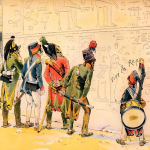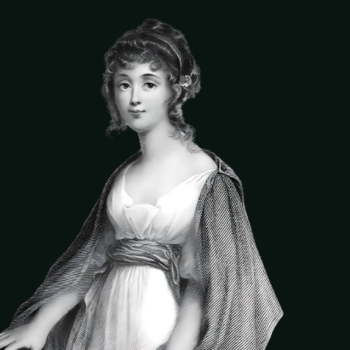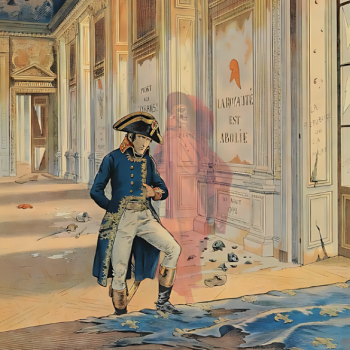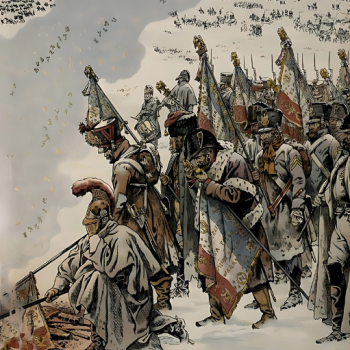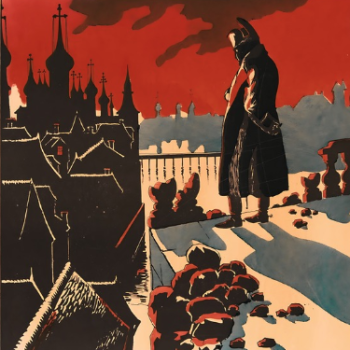A Tournament Of Shadows
III. “Someone To Open The Gates”
General Napoleon Bonaparte first held command in Italy in 1796. The land at the time being a collection of city-states, Papal States, and territories under the Austro-Hungarian Empire ruled over by the Habsburg Dynasty.[1] In the words of Austrian chancellor von Metternich, Italy was not a nation, it was a “mere geographical expression.”[2] Napoleon’s army, “heroes in rags” as they would come to be known, were of poor material. Ill-clad, ill-fed, and ill-equipped, they were in a bad position when they faced off against the Austro-Piedmontese army which outnumbered them. Napoleon, however, saw one thing plainly; if he kept his forces together and separated his enemies, he could make himself stronger than either, and win by operating against each in turn. As was his custom, Napoleon watched the heavens before the battle for a blood-stained star which, he believed, was a kind of “protecting genie.”[3]
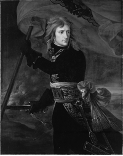
General Napoleon Bonaparte,
Commander Of The Armée d’Italie On The Bridge At Arcole.
Perhaps it was mere superstition, but it was not unwarranted. A comet had preceded the death of Caesar Augustus in 14 C.E. A like celestial harbinger presaged the death of the Roman Emperor Vespasian in 79 C.E. However one interpreted their appearance, the arrival of these comets was nothing short of a survey of spiritual revolution, pestilence and war. A comet was seen in 337 C.E., just before the death of Constantine the Great. A sword-shaped comet accompanied the end of the Western Roman Empire when, in 410 C.E., it was sacked by the Visigoths. In 422 C.E, one prefaced the appearance in Europe of Attila, “the Scourge of God,” and his hordes of Huns. There was a scimitar-shaped comet over Arabia when the Prophet Muhammed was born in 570 C.E.; another scimitar-shaped comet appeared when he began preaching the Qur’an in 610 C.E. In 622 C.E. a comet mirrored his flight to Medina, while a fourth scimitar-shaped comet was over Arabia in 624 C.E. during Muhammed’s first battle for Islam. The last appearance of Muhammed’s comet appeared during the last week of June 632 C.E., coinciding with the Prophet’s death. In 800 C.E. a comet was seen during the coronation of Charlemagne as first Emperor of the Holy Roman Empire, and a torch-shaped comet heralded his death in 814 C.E. In 1000 C.E. a comet was observed over all of Europe. It was “shaped like a horrible serpent and so bright that its light was seen even indoors.” It was taken to foretell the end of the world—the Millenium prophesied in the Apocalypse. When it was followed by earthquakes, floods, and famine, there was universal panic. In 1002 C.E. a comet over Britain and Scandinavia coincided with a massacre of all the Danes in England by King Ethelred. Around Easter 1066 C.E., a comet in the skies signaled English defeat at the hands of William the Conqueror and his invading French army. A whole army of French and German crusaders was utterly destroyed in 1148 C.E. after a comet appeared. In 1200 C.E. Arab astronomers recorded a comet over North Africa, and this was followed by a bloody revolt of Arab warriors in Morocco. A lance-shaped comet shined over Western Europe for eighteen nights, just as the Children’s Crusade was inaugurated. Thousands of German and French boy-Crusaders either perished or were sold into slavery. At the same time, the Mongol hordes invaded Russia and Poland. In 1264 C.E. a very bright comet was observed over Europe for three months. Pope Urban IV died on the night of its disappearance. A general massacre of Jews in the German city of Nuremberg in 1298 C.E. was said to be the result of a comet sighting. In 1300 C.E. a brilliant comet preceded the jubilee of Pope Boniface VIII, who interpreted it as a happy omen. Popular dread at the sight of the comet, however, resulted in riots and bloodshed in Rome and elsewhere in Italy. In 1305 C.E., a comet “of horrible aspect” burned all throughout Passion Week preceding the terrible “black plague” which swept all over Europe. This event repeated itself in 1347 C.E., announcing the arrival of the “Black Death.” The appearance of a comet in 1456 C.E. at the moment the Turks became masters of Constantinople (and seemed liable to overrun all of Europe) was regarded by Christendom with supernatural horror. In 1492 Arab astronomers discovered a comet over North Africa and Spain. Catholic Spain subsequently ousted the Moors in a final conquest of Granada, and the “New World” was discovered. In 1500 C.E. a sword-shaped comet preceded a Tartar invasion of Russia and Poland. A comet in 1531 C.E. warned the Great Schism of German Protestants from the Catholic Church. In 1572 C.E., 30,000 French Protestants were massacred as St. Bartholomew’s comet blazed above. 1618 C.E., a bloody uprising of Protestants in Bohemia, followed by the outbreak of the Thirty Years’s War; 1680 C.E., France overran Alsace and carried war into Germany, War between Venice and the Turks. 1689 C.E., wars between France, Germany, England, Spain, Italy. Religious war in Ireland and Scotland. 1729 C.E., war between France, England, and Spain. 1744 C.E., death of German (Holy Roman) Emperor Charles VII. War between Frederick the Great of Prussia and Maria Teresa of Austria. 1759 C.E., the Seven Years’ War; Frederick the Great overthrown in four bloody battles.[4] The next comet was closer to Napoleon. In 1769, the year that he was born, a comet of unusual red luster was observed over Italy and France. Soon after, the French overran Corsica, the birthplace of Napoleon, and committed a bloody massacre of the Corsicans. When Napoleon was born on August 15, the comet was seen no more.[5]
Napoleon assembled his forces and moving in one body upon the enemy’s strung-out line on the Maratime Alpine country, broke through its center. The Austrians retreated to their base in the east, the Piedmontese towards theirs in the west. Marching on the Piedmontese with unprecedented rapidity, Napoleon forced them to a peace. Before the Austrians had any idea of what he was doing, Napoleon turned against them, driving them nearly to Vienna in a series of sharp operations. Napoleon conquered Italy in his first campaign, winning him glory, and placed him at the head of all the generals of Europe.[6] From his earliest childhood, Napoleon’s parents rested all their hopes on him. When his father was on his deathbed at Montpelier in 1785, he spoke only of Napoleon (who was then at military school.) In the delirium with which he was seized in his last moments, he incessantly called on Napoleon to come to his aid with his “great sword.”[7] Napoleon’s achievement in Italy, however, did not satisfy his ambition.
Upon his return to France, Napoleon suggested to Talleyrand, the Minister of Foreign Affairs, of undertaking an effort against England in another quarter of the globe, that is, seizing Malta and proceeding to Egypt, thereby gaining a territory capable of supplying to France the loss of her West Indian colonies (and also a means of annoying Great Britain in her Indian trade and empire. The East presented to Napoleon a field of conquest. “Europe is but a molehill,” he declared. “All the great glories have come from Asia where there are six hundred millions of men.”
The Directory of France was pleased with this plan, especially since it found employment for the power-hungry Napoleon at a distance far from France. Napoleon selected and equipped the army, raised capital, and collected ships. He was busy, day and night, organizing the armament which was to be under his total command. Everyone soon wished to accompany Napoleon to the East; civilians, scholars, engineers, and artists all wished to make the journey. Napoleon, likewise, was keen on bringing the savants from the newly founded Institut de France in 1795.[8] Modern nationalism appeared in continental Europe in the wake of the French Revolution. With nationalism there was national pride, and with national pride came national competition. This, no doubt, was part of the reason that Napoleon brought with him a team of French savants (scholars) of the Commission des Sciences et des Arts. Themes of race, language, and nationhood occupied the minds of scholars, poets, and politicians alike at this time, and the emerging field of philology (science of language) was gaining traction. [9] The British were already ahead of the French in this field of study. After the Battle Of Plassey in 1757, the British East India Company’s Army effectively assumed control of India, steadily expanding their rule throughout the Subcontinent. In 1783, William Jones, a philologist employed by the British East India Company (EIC,) arrived in Madras, tasked with compiling a digest of “Hindu Law” with which the British could use in adjudicating legal cases pertaining to the Hindu population.[10] After consulting with local Brahmins, Jones translated the Laws of Manu, and used it as the basis for the EIC’s Hindu-Indian legal system.[11] After a careful study of South Asian languages, Jones delivered a ground-breaking lecture in 1788 in which he suggested that “Greek, Latin, Celtic, French, and Germanic languages had definite affinities with the Sanskrit.”[12] In 1792, five years before, Jones made the ground-breaking declaration that Hebrew was not the original language of mankind.[13]
In April 1798, the various squadrons of the French fleet were assembled at Toulon. The embarkment, however, was to take place at Civita Vecchia. When asked if he should remain long in Egypt, Napoleon replied: “A few months, or six years—it all depends upon circumstances.” Napoleon then called his vast army together in sight of the ships that would carry them from the shores of France.
“Rome fought Carthage on sea, as well as on the land; England is the Carthage of France,” said Napoleon. “I have come to lead you in the name of the Divinity of Liberty, across mighty seas, and into distant regions, where your valor may achieve such life and glory as will never await you beneath the cold skies of the West. Prepare yourselves, soldiers, to embark under the tricolor for achievements far more glorious than you have won for your country on the blushing plains of Italy.”
He then agreed to give each soldier seven acres of land, and since his promises had not hitherto been violated, the soldiers cheered with joy, quite prepared to obey him with alacrity. “Long live the Republic!” they shouted.
The British government, vigilantly observing the preparations that were going on in France, kept a fleet in the Mediterranean under the command of Admiral Horatio Nelson. As the political pretext for Napoleon’s campaign in Egypt was striking at England through India, the British were, naturally, disinclined to have the French marching through the Levant.[14] It was, therefore, highly important that the French squadron sail without delay to avoid the risk of being discovered by British cruisers, but “contrary winds” detained it for ten days. On the evening of May 19, 1798, fortune favored Napoleon, and the troops embarked while the British fleet was compelled to dock in port to repair ships that had been disabled in a violent gale.
The French fleet carried roughly 40,000 men of all sorts and ten thousand sailors. In the army, there were many veteran soldiers, selected from the Army of Italy, and commanded by the first generals of France (Kléber, Desaix, Berthier, Regnier, Murat, Lannes, Andreossi, Junot, Menou, and Belliard) all of which served in this campaign. Napoleon’s wife, Josephine, accompanied her husband to Toulon, and remained with him up until the final moment. The sun rose with great brilliancy on the armament as the last of the French troops stepped on board, and sails were immediately set for the East. On June 8, the convoys from Italy joined the squadron out at sea; on the 10th the whole fleet was assembled before Malta. Napoleon’s first object was to take possession of that island. He had already secured a secret party among that ancient order of knights, and a very slight demonstration of hostilities was sufficient to spread consternation among them. They opened their gates to the French without delay, and nearly all the knights entered the ranks of the French army.
“It is fortunate there is someone to open the gates for us,” General Caffarelli dryly remarked to Napoleon, as the French troops passed through the almost impregnable fortifications. “Had there been no garrison at all, it would have been terrible hard work.”
Leaving a sufficient garrison in Malta the French squadron was again under sail on June 16. While the officers and savants devoted much time to the discussion of military and scientific topics, the greater object of excitement and solicitude was devoted to evading the British fleet. The French vessels, densely crowded with troops, were additionally encumbered with civil and military baggage, provisions, stores, etc. “God grant that we may pass the English without meeting them,” said Napoleon.[15]
SOURCES:
[1] Zariski, Raphael. “The Establishment Of The Kingdom Of Italy As A Unitary State: A Case Study In Regime Formation.” Publius. Vol. XIII, No. 4 (Autumn 1983): 1-19.
[2] Ferretti, Federico. “Inventing Italy. Geography, ‘Risorgimento’ And National Imagination: The International Circulation Of Geographical Knowledge In The Nineteenth Century.” The Geographical Journal. Vol. CLXXX, No. 4 (December 2014): 402-413.
[3] “Fiery Sword In The Sky Draws All Eyes.” The World. (New York, New York) March 8, 1898; Koenig, Duane. “Comets, Superstitions, And History.” Quarterly Journal Of The Florida Academy Of Sciences. Vol. XXXI, No. 2 (June 1968): 81-92.
[4] “The Harmless Tramp Of The Skies.” The Illustrated American. Vol. XII, No. 147 (December 10, 1892): 593; “Comets That Have Heralded Deaths Or Great Disasters.” The Inter Ocean. (Chicago, Illinois) June 26, 1910; “Long-Tailed Comet Shows In June.” The Spokesman-Review. (Spokane, Washington) May 29, 1921.
[5] Emerson, Edwin. Comet Lore: Halley’s Comet In History. The Schilling Press. New York, New York. (1910): 52.
[6] Dodge, Theodore A. “Napoleon.” The Salt Lake Herald. (Salt Lake City, Utah) October 8, 1893.
[7] “Early Promise.” The Portland Gazette. (Portland, Maine) October 7, 1823.
[8] Lichtheim, George. “The Concept Of Ideology.” History And Theory. Vol. IV, No. 2 (1965): 164-195.
[9] Tarbell, Ida M. A Short Life Of Napoleon Bonaparte. S. S. McClure, Limited. New York, New York. (1895): 46-47.
[10] Johnston, Charles. “Lovers of the East: Sir William Jones (1746-1794.)” The Oriental Department Papers. No. 23. (May 1895): 141-144; Master, Alfred. “The Influence of Sir William Jones upon Sanskrit Studies.” Bulletin of the School of Oriental and African Studies, University of London. Vol. XI, No. 4 (1946): 798-806.
[11] Jones states: “The legislature of Britain having […] an intention to leave the natives of these Indian provinces in possession of their own Laws, at least on the titles of contracts and inheritances […] Whatever opinion in short may be formed of Manu and his laws in a country happily enlightened by sound philosophy, and the only true revelation, it must be remembered that those laws are actually revered as the word of the Most High by nations of great importance to the political and commercial interests of Europe, and particularly by many millions of Hindu subjects whose well-directed industry would add largely to the wealth of Britain, and who ask no more in return than protection.” [Jones, William. Institutes of Hindu Law. Rivingtons and Cochran. London, England. (1825): vii-xxii.]
[12] Dunlap, Knight. “The Great Aryan Myth.” The Scientific Monthly. Vol. LIX, No. 4 (October 1944): 296-300.
[13] Jones states: “The Sanskrit language, whatever be its antiquity, is of a wonderful structure; more perfect than the Greek, more copious [having more cases] than the Latin, and more exquisitely refined than either, yet bearing to both of them a stronger affinity, both in the roots of the verbs and in the forms of the grammar, than could possibly have been produced by accident; so strong indeed, that no philologer could examine them all three, without believing them to have sprung from some common source, which, perhaps, no longer exists; there is a similar reason […] for supposing that both the Gothic and the Celtic […] had the same origin with the Sanskrit; and the old Persian might be added to the same Family […] It seems to follow, that the only human family after the flood established themselves in the northern parts of Iran; that, as they multiplied, they were divided into three distinct branches, each retaining little at first, and losing the whole by degrees, of their common primary language; but agreeing severally on new expressions for new ideas; that the branch of [Japheth] was enlarged in many scattered shoots over the north of Europe and Asia, diffusing themselves as far as the western and eastern seas, and, at length in the infancy of navigation, beyond them both […]”[Jones, William. Discourse the Ninth: “The Origin and Families of Nations.” Delivered February 23, 1792, at a meeting of the Asiatick Society of Bengal.]
[14] Mattelart, Armand. (trs.) Emanuel, Susan; Cohen, James A. Mapping World Communication: War, Progress, Culture. University Of Minnesota Press. Minneapolis, Minnesota. (1994): vii.
[15] Gibbs, Montgomery B. Military Career Of Napoleon The Great. The Saalfield Publishing Co. New York, New York. (1895): 109-113.



